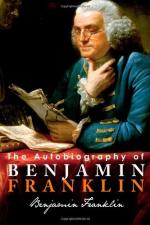Josiah, my father, married young, and carried his wife with three children into New England, about 1682. The conventicles having been forbidden by law, and frequently disturbed, induced some considerable men of his acquaintance to remove to that country, and he was prevailed with to accompany them thither, where they expected to enjoy their mode of religion with freedom. By the same wife he had four children more born there, and by a second wife ten more, in all seventeen; of which I remember thirteen sitting at one time at his table, who all grew up to be men and women, and married; I was the youngest son, and the youngest child but two, and was born in Boston, New England. My mother, the second wife, was Abiah Folger, daughter of Peter Folger, one of the first settlers of New England, of whom honorable mention is made by Cotton Mather in his church history of that country, entitled Magnalia Christi Americana, as ’a godly, learned Englishman,” if I remember the words rightly. I have heard that he wrote sundry small occasional pieces, but only one of them was printed, which I saw now many years since. It was written in 1675, in the home-spun verse of that time and people, and addressed to those then concerned in the government there. It was in favor of liberty of conscience, and in behalf of the Baptists, Quakers, and other sectaries that had been under persecution, ascribing the Indian wars, and other distresses that had befallen the country, to that persecution, as so many judgments of God to punish so heinous an offense, and exhorting a repeal of those uncharitable laws. The whole appeared to me as written with a good deal of decent plainness and manly freedom. The six concluding lines I remember, though I have forgotten the two first of the stanza; but the purport of them was, that his censures proceeded from good-will, and, therefore, he would be known to be the author.
“Because
to be a libeller (says he)
I
hate it with my heart;
From
Sherburne town, where now I dwell
My
name I do put here;
Without
offense your real friend,
It
is Peter Folgier.”
My elder brothers were all put apprentices to different trades. I was put to the grammar-school at eight years of age, my father intending to devote me, as the tithe of his sons, to the service of the Church. My early readiness in learning to read (which must have been very early, as I do not remember when I could not read), and the opinion of all his friends, that I should certainly make a good scholar, encouraged him in this purpose of his. My uncle Benjamin, too, approved of it, and proposed to give me all his short-hand volumes of sermons, I suppose as a stock to set up with, if I would learn his character. I continued, however, at the grammar-school not quite one year, though in that time I had risen gradually from the middle of the class of that year to be the head of it, and farther was removed into the next




